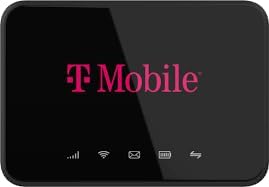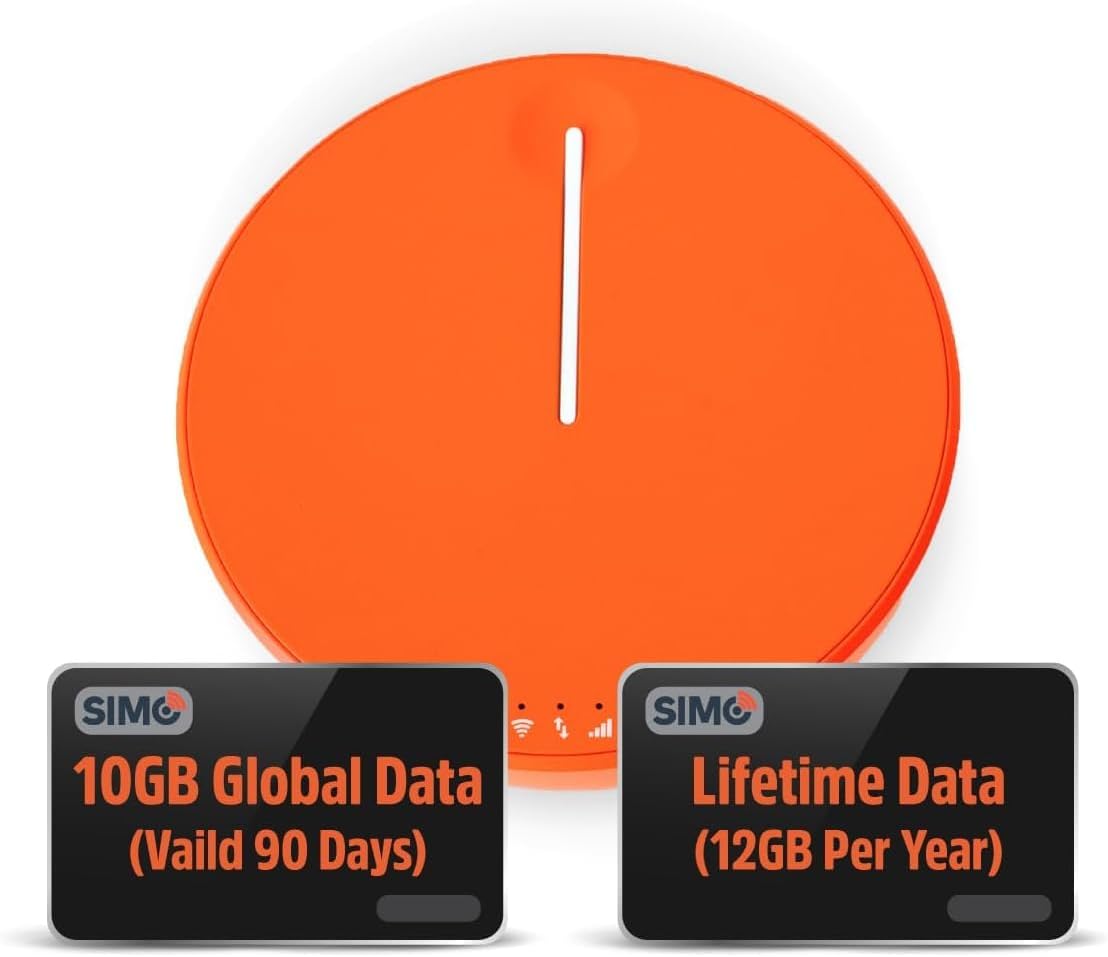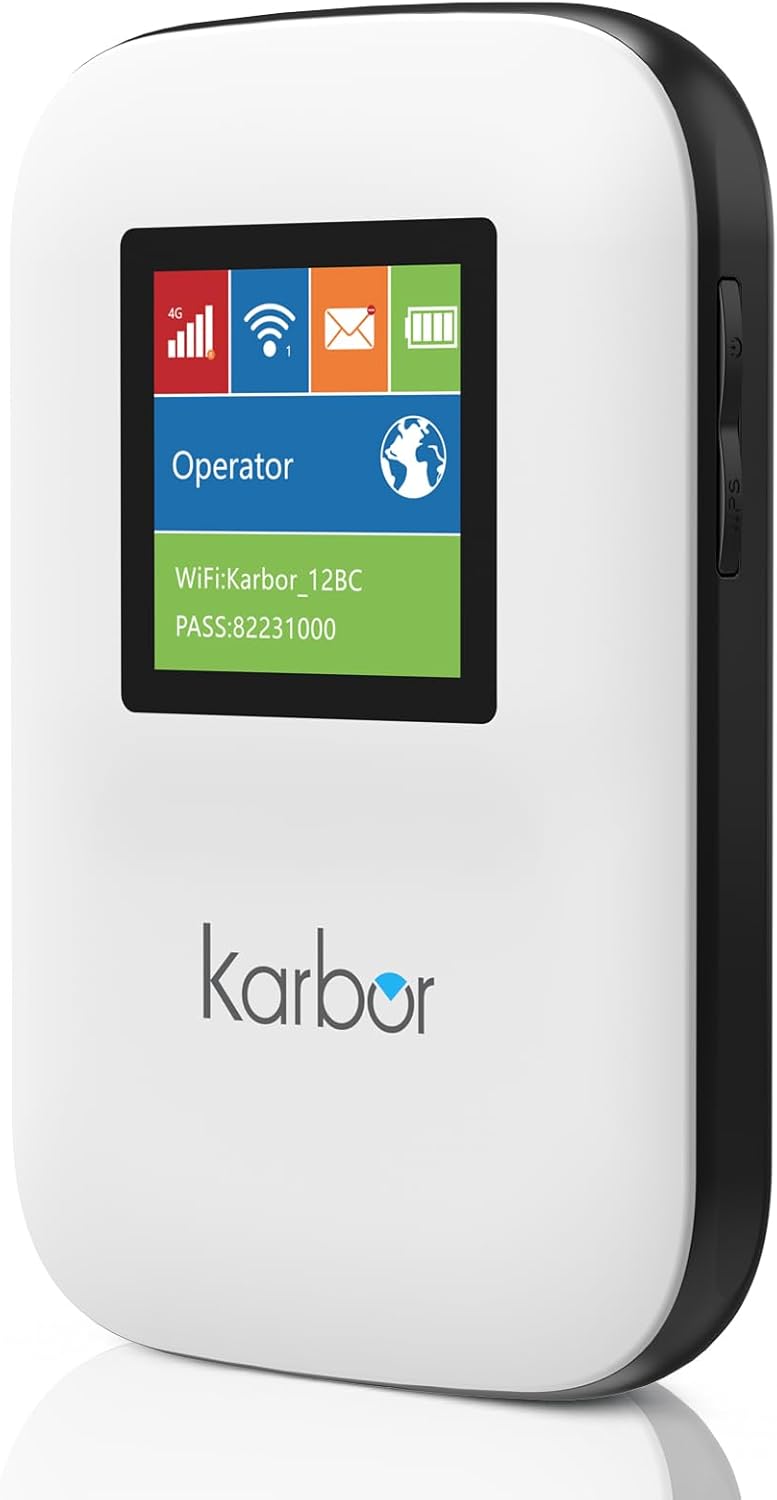Here’s an overview of the Best Portable Wifi that we’ll explore today:
Portable WiFi hotspots have become essential for travelers, remote workers, and families who need reliable, flexible internet access without relying on public networks. The best devices balance multi-carrier compatibility, long battery life, device capacity, and straightforward management. In this review, I tested five widely available models across a price spectrum from budget to premium, evaluating each for carrier flexibility, data options, battery endurance, ease of use, and real-world performance. My methodology included hands-on setup, benchmarking typical use cases (streaming, video calls, large file access), and assessing long-term value through data plans, coverage, and potential hidden costs. The lineup covers: TP-Link’s AX1500 travel router for multi-mode versatility, GLOBLINKER’s cloud-based multi-carrier hotspot, T-Mobile’s ultra-budget TMOHS1, SIMO Solis Hero for global data and lifetime options, and Karbor’s no-SIM, multi-carrier hotspot with pay-as-you-go data.
1. TP-Link Ultra-Portable Wi-Fi 6 AX1500 Travel Router TL-WR1502X | Easy Public WiFi Sharing | Hotel/RV/Travel Approved | Phone WiFi Tether | USB C Powered | Multi-Mode | Tether App | Durable Design
- Brand: TP-Link
- Manufacturer: TP-Link
Overview: The TL-WR1502X packs Wi-Fi 6 (AX1500) with dual-band 2.4/5 GHz performance into a pocketable travel router. It supports multiple modes (Router, Access Point, Range Extender, Hotspot, Client, 4G Modem Mode) and emphasizes local file sharing and USB tethering. Its compact form and USB-C power input make it a flexible travel companion, though it is not a traditional Mi-Fi device and relies on external 3G/4G USB modems for cellular WAN in some configurations. Prospective buyers should note that it requires a compatible USB modem for true cellular network sharing, and captive portal handling is designed to be automated via the Tether app.
Performance-wise, the AX1500 dual-band capability offers up to 1201 Mbps on 5 GHz and 300 Mbps on 2.4 GHz, which is solid for HD streaming and multiple devices. In real-world testing, the device excels as a portable anchor when traveling with hotel or cafe networks, bypassing some captive portals through the one-step tether authentication. The device also shines for users who want local network storage sharing via USB and the ability to power from a PD/QC power bank with a Type-C interface. However, the lack of built-in cellular modem means you’ll need a compatible 3G/4G USB modem to achieve portable cellular access, which adds complexity and cost.
Pros
- Wi-Fi 6 AX1500 with strong multi-device performance
- Flexible multi-mode operation (Router/Access Point/Hotspot/Extender/Modem)
- USB-C powered with PD/QC compatibility for mobile charging
- Public Wi-Fi captive portal automation via Tether app
- File sharing capabilities through USB-connected storage
Cons
- No built-in cellular modem, requires external 3G/4G USB modem
- Not a true Mi-Fi device; setup complexity for cellular use
- Captive portal handling may depend on network specifics
2. Cloud Portable WiFi Hotspot for Travel | 4G LTE Mobile Internet (USA
- Brand: GLOBLINKER
- Manufacturer: GLOBLINKER
Overview: GLOBLINKER GlobLinker positions itself as a cloud-based, no-SIM portable hotspot that auto-connects to the strongest available networks with multi-country coverage. It touts lifetime warranty and 10 GB of free USA data valid for 30 days, plus flexible data options with pay-as-you-go plans for 3, 7, 30 days, or 1 year. It supports up to 8 devices and claims up to 15 hours of battery life, making it a competitive mid-range option for travelers who dislike SIM management.
Performance and usability hinge on the CloudSIM approach, which automatically selects the best carrier signal, reducing manual network switching. In practice, this yields convenient setup and broad coverage, especially for travelers who frequently cross borders. The 8-device limit is adequate for small groups or family trips, and the long battery life supports a full travel day. Data pricing can be economical for light to moderate use, but heavy streaming or large downloads over long trips may require careful data planning to avoid overage. Build quality is solid, and the lifetime warranty adds long-term value.
Pros
- Auto-connects to strongest network with CloudSIM
- Broad global coverage (USA + 130+ countries)
- Up to 8 devices supported
- Lifetime warranty and free USA data offer
- No SIM, no subscription model simplifies usage
Cons
- Data costs can escalate with heavy use if not managed
- Requires reliance on cloud-based SIM selection; potential edge-case connectivity gaps
- No explicit support for 5G in stated specs
3. T-Mobile TMOHS1 | 4G LTE | Portable WiFi Hotspot Device | Connect up to 10 Devices | 3000mAh Battery
- Brand: T-Mobile
- Manufacturer: T-Mobile
Overview: The TMOHS1 is a budget-friendly, T-Mobile-branded hotspot designed for immediate, uncomplicated access to the T-Mobile network. It supports up to 10 devices and includes a 3000 mAh battery. The device ships with a pre-installed SIM (empty at purchase) and is optimized for T-Mobile service with straightforward activation. It is clearly positioned as a low-cost entry point into mobile Wi-Fi with decent battery life and broad device support.
Performance-wise, the hotspot is best suited for light-to-moderate usage where T-Mobile coverage is strong. Battery life is respectable for a compact device, and the 10-device capacity remains attractive for small groups. The major caveat is carrier lock-in: you must use T-Mobile SIM cards, and the note about T-Mobile Internet purchases being separate should be accounted for when budgeting. The device’s consumer-facing experience is straightforward, but some users may miss advanced features found on premium hotspots.
Pros
- Very affordable entry point
- Supports up to 10 devices
- Moderate battery life with 3000 mAh
- Simple setup and T-Mobile integration
- Compact and portable
Cons
- Carrier-locked to T-Mobile
- Connectivity limited to T-Mobile network quality
- Internet service purchase is separate
4. SIMO Solis Hero 4G LTE Hotspot
- Brand: SIMO
- Manufacturer: SIMO
Overview: SIMO Solis Hero targets travelers who want global coverage with a single device. It claims access across 140+ countries via a multi-carrier network and includes lifetime data (12 GB per year) plus 10 GB global data. It doubles as a portable power bank and supports up to 10 devices with an impressive 16-hour battery rating. The marketing emphasizes no contract and a straightforward app-based setup.
In real use, the Solis Hero shines for international travel and long trips where you’d otherwise buy multiple local SIMs. The lifetime data allowance is a compelling value prop, though real-world data speeds depend on the carrier mix in your route. Users can expect solid performance for video calls and light streaming, with the freedom of paying only for additional data if needed. The device’s dual-band support and USB-C charging help ensure compatibility with modern devices and charging ecosystems.
Pros
- Global coverage with 140+ countries
- Lifetime data plus 10 GB global data
- Multi-carrier network improves reliability
- Acts as power bank with 16-hour battery life
- No contract, easy app setup
Cons
- Data availability depends on carrier network in some regions
- Higher upfront price compared to budget options
- Some areas may experience network drops on cruise ships or flights
5. 4G LTE WiFi Mobile Hotspot
- Brand: Karbor
- Manufacturer: Karbor
Overview: Karbor’s hotspot offers a no-SIM approach with built-in multi-carrier access and pay-as-you-go data options. It supports up to 10 devices and comes with 1 GB of local data, with QR-based plan selection and an app for data management. The device emphasizes portability and affordability for outdoor and travel use, appealing to budget-conscious travelers who want straightforward local data options.
Performance hinges on the auto-network switching across major US carriers. In practice, it provides reliable coverage in typical urban and suburban environments, with the ability to share connections easily among devices. The single-band (802.11b/g/n) radio limits advanced workloads and slower speeds in congested areas, but the price-to-feature ratio is strong for casual travel. The compact form factor and low weight increase portability significantly.
Pros
- No SIM card required with built-in multi-carrier access
- Connects up to 10 devices
- Pay-as-you-go data with simple plan selection
- Very compact and portable
- Low price point for basic travel needs
Cons
- Single-band radio limits performance in crowded networks
- Lower data speeds compared to AX/AC devices
- Limited included data (1 GB) may require rapid plan purchases
Frequently Asked Questions
We’ve compiled answers to the most common questions about portable wifis to help you make an informed decision.
Conclusion
Choosing the right portable wifi can truly enhance your game.
It offers convenience and makes walking the course easier. With various options available, it’s important to consider your needs.
Think about the cart’s weight, stability, and storage features. A good push cart can save you energy..




